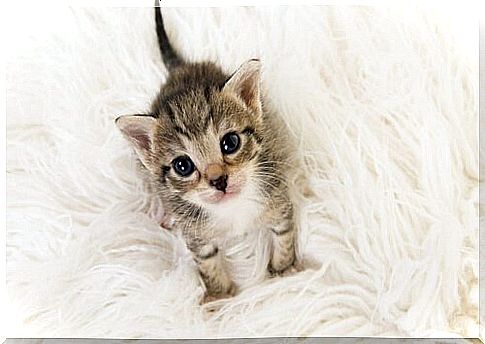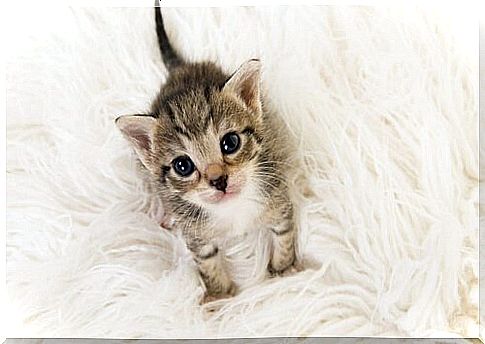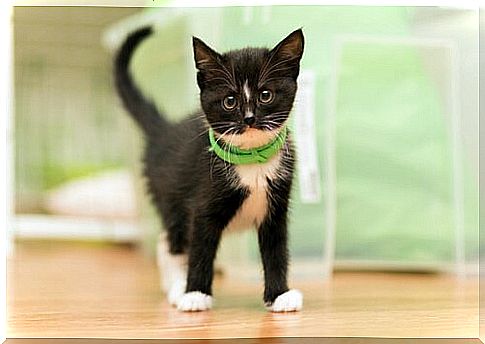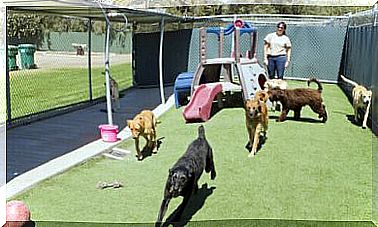How To Care For A Baby Cat

Maybe you found the kitten on the street without its mother, or maybe you just adopted it and it recently stopped being breastfed. In this article, we’re going to teach you how to care for a baby cat so you can provide everything it needs.
Tips for Caring for an Orphaned Baby Cat
Taking care of a baby cat less than three weeks old is a challenge. That’s because the animal requires all kinds of attention. With dedication, a lot of love and kindness, he will be able to survive, even if he doesn’t have his mother by his side.
-
maintain body temperature
When the puppies are born, they spend the whole day beside their mother’s belly. In addition to feeding, this proximity allows them to stay warm. Therefore, you must offer everything he needs so that his temperature does not drop; especially at night, as he is not yet able to regulate his body heat.
You can wrap it in a blanket or use a thermal pillow. If you have other pets, you can use them as babysitters to give them warmth (and also affection). Otherwise, if the baby cat is still crying or shivering and has its cold pads on, wrap it in your lap.

-
Do not give ‘ordinary’ milk
A very common mistake when finding a baby cat is heating the milk in the fridge and giving it to it. This liquid is not good for his health because it lacks the necessary nutrients and can even cause stomach problems such as diarrhea and vomiting.
In pet stores, there is special powdered milk for newborn cats, which replaces the mother’s. If you are unable to buy it, give a thin rice porridge a syringe, consult a veterinarian for exact measurements. In addition, you can give the milk from a bottle, with the liquid at 37°C. Remember, he must be fed every three hours!
-
Teach your baby cat to do its own thing
Among the main tasks to take care of an orphaned baby cat is teaching it to do its own thing. The mother would be responsible for stimulating him, licking his belly, genitals and anus. In your case, just wet a cotton ball with warm water and pass it over your genitals and anus.
Tips for caring for an unweaned baby cat
After four weeks of life, puppies stop feeding on breast milk. They have already opened their eyes and know how to go about their business; but they still have a lot to learn. If you’ve adopted a baby cat that hasn’t weaned yet, follow these tips:
-
give him special food
At pet stores, you can find puppy foods that are softer than adult foods and contain other types of nutrients and ingredients. These foods are also a suitable size for these animals’ small mouths.
Arm yourself with patience and feed the food little by little. At first; they won’t know what to eat or what to chew. You might have to take them one by one in the mouth. Then he will learn to do it himself.
-
take him to the veterinarian
It doesn’t matter if you’ve adopted it from a shelter, if it’s the kitten of someone you know, or if you found it on the street…all cats need a trip to the vet when they’re babies.

The professional will examine you, give you all the vaccinations and give you some advice about your care and nutrition. This way, the animal will not get sick and will live for many years. In addition, you can take the opportunity to clarify your doubts about a specific breed – in case it is one – and about its care, for example; Siamese , Persian, etc.
-
Avoid domestic hazards
If you’ve never had a pet, let alone a cat, your home may not be suitable for an animal. Don’t worry, you can improve it with just a few changes.
To get started, close open windows or use a screen to prevent access to terraces and balconies. Until the cat gets used to walking alone everywhere, monitor the areas it visits.
Another very important issue is hiding electrical cables, small objects (such as pens), medicines and cleaning products. Cats are very skilled and can open doors and drawers, so don’t trust them.
Close the lid of the trash can and the toilet. Don’t leave the bedroom or bathroom door open – or the room you don’t want him to enter. Pay attention to plants: some of them can be toxic to cats.









